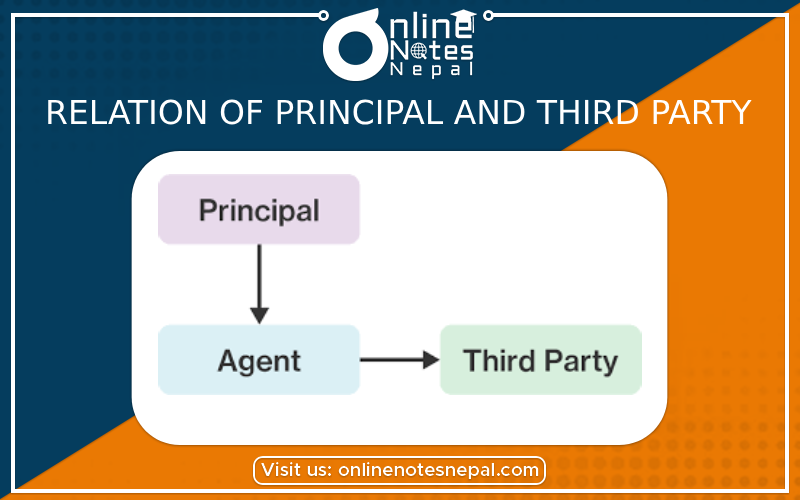Published by: Anu Poudeli
Published date: 06 Aug 2023

A principal-third-party relationship is a concept that is frequently found in legal and business situations. It refers to the contacts and legal responsibilities of one person or entity (the primary) and another person or entity (the third party). Contractual agreements or agency law are frequently used to control this relationship. The following are the major features of the principal-third-party relationship:
1. Principal : The principal is a person or entity who permits another person (the agent) to act on their behalf in certain situations. The agent operates as the principal's intermediary, carrying out tasks or making decisions in accordance with the principal's instructions and best interests. Individuals, businesses, organizations, and governments can all serve as principals.
2. Agent : The agent is the person or entity whom the principal appoints to act on their behalf. Agents can be given varied degrees of authority, which might be broad or limited to specific responsibilities. They must behave in good faith, follow the principal's directions, and act in the best interests of the principal.
3.Third Party: A third party is an outside individual or entity that communicates with the agent on the principal's behalf. The third party is unrelated to the principle-agent relationship but conducts transactions or contacts with the agent on behalf of the principal.
4. Agency Relationship : The principal-agent connection is frequently referred to as an agency relationship. Any activities made by the agent within the limits of their authority are legally binding on the principal. This means that the principal can be held accountable for the agent's activities as long as the agent is acting in the scope of their authority.
5. Types of Authority : Actual authority (explicitly granted by the principal), apparent authority (when the principal's actions or statements lead others to believe the agent has authority), and inherent authority (implied by the agent's position or relationship with the principal) are all examples of authority.
6. Duties and Liabilities : for services and payment for expenses spent throughout the agency relationship. The agent, on the other hand, has a fiduciary duty to operate in the best interests of the principal and avoid any conflicts of interest. Third parties can generally hold the principal accountable for their agent's activities within the scope of the agency.
Agency Termination: The agency connection can be dissolved by mutual consent, completion of the agency's objective, expiration of a designated period, or by operation of law. To avoid potential liabilities for unlawful activities by the former agent, it is critical for the principal to notify relevant third parties of the termination of an agency.
In summary, a principal's relationship with a third party is established by the actions of an agent acting on the principal's behalf. This relationship has legal ramifications, and all parties involved must understand their individual duties and responsibilities to guarantee seamless and lawful interactions.